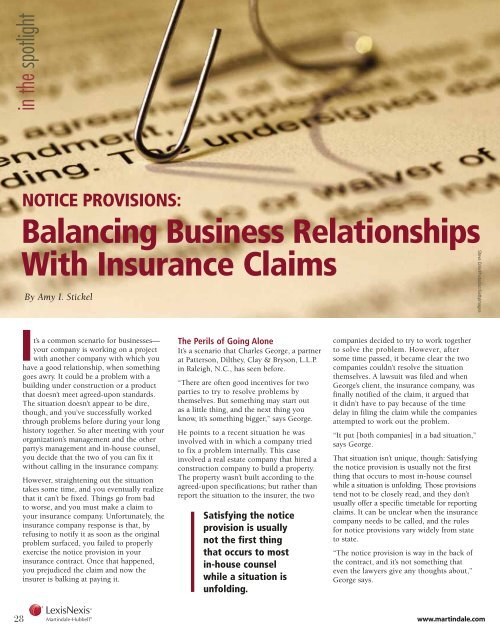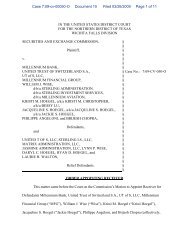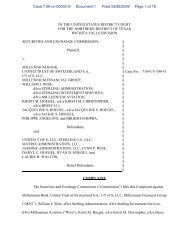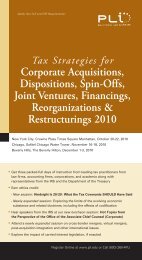View the full text of this document - Martindale.com
View the full text of this document - Martindale.com
View the full text of this document - Martindale.com
Create successful ePaper yourself
Turn your PDF publications into a flip-book with our unique Google optimized e-Paper software.
in <strong>the</strong> spotlight<br />
NOTICE PROVISIONS:<br />
Balancing Business Relationships<br />
With Insurance Claims<br />
By Amy I. Stickel<br />
Steve Cole/Photodisc/GettyImages<br />
It’s a <strong>com</strong>mon scenario for businesses—<br />
your <strong>com</strong>pany is working on a project<br />
with ano<strong>the</strong>r <strong>com</strong>pany with which you<br />
have a good relationship, when something<br />
goes awry. It could be a problem with a<br />
building under construction or a product<br />
that doesn’t meet agreed-upon standards.<br />
The situation doesn’t appear to be dire,<br />
though, and you’ve success<strong>full</strong>y worked<br />
through problems before during your long<br />
history toge<strong>the</strong>r. So after meeting with your<br />
organization’s management and <strong>the</strong> o<strong>the</strong>r<br />
party’s management and in-house counsel,<br />
you decide that <strong>the</strong> two <strong>of</strong> you can fix it<br />
without calling in <strong>the</strong> insurance <strong>com</strong>pany.<br />
However, straightening out <strong>the</strong> situation<br />
takes some time, and you eventually realize<br />
that it can’t be fixed. Things go from bad<br />
to worse, and you must make a claim to<br />
your insurance <strong>com</strong>pany. Unfortunately, <strong>the</strong><br />
insurance <strong>com</strong>pany response is that, by<br />
refusing to notify it as soon as <strong>the</strong> original<br />
problem surfaced, you failed to properly<br />
exercise <strong>the</strong> notice provision in your<br />
insurance contract. Once that happened,<br />
you prejudiced <strong>the</strong> claim and now <strong>the</strong><br />
insurer is balking at paying it.<br />
The Perils <strong>of</strong> Going Alone<br />
It’s a scenario that Charles George, a partner<br />
at Patterson, Dil<strong>the</strong>y, Clay & Bryson, L.L.P.<br />
in Raleigh, N.C., has seen before.<br />
“There are <strong>of</strong>ten good incentives for two<br />
parties to try to resolve problems by<br />
<strong>the</strong>mselves. But something may start out<br />
as a little thing, and <strong>the</strong> next thing you<br />
know, it’s something bigger,” says George.<br />
He points to a recent situation he was<br />
involved with in which a <strong>com</strong>pany tried<br />
to fix a problem internally. This case<br />
involved a real estate <strong>com</strong>pany that hired a<br />
construction <strong>com</strong>pany to build a property.<br />
The property wasn’t built according to <strong>the</strong><br />
agreed-upon specifications; but ra<strong>the</strong>r than<br />
report <strong>the</strong> situation to <strong>the</strong> insurer, <strong>the</strong> two<br />
Satisfying <strong>the</strong> notice<br />
provision is usually<br />
not <strong>the</strong> first thing<br />
that occurs to most<br />
in-house counsel<br />
while a situation is<br />
unfolding.<br />
<strong>com</strong>panies decided to try to work toge<strong>the</strong>r<br />
to solve <strong>the</strong> problem. However, after<br />
some time passed, it became clear <strong>the</strong> two<br />
<strong>com</strong>panies couldn’t resolve <strong>the</strong> situation<br />
<strong>the</strong>mselves. A lawsuit was filed and when<br />
George’s client, <strong>the</strong> insurance <strong>com</strong>pany, was<br />
finally notified <strong>of</strong> <strong>the</strong> claim, it argued that<br />
it didn’t have to pay because <strong>of</strong> <strong>the</strong> time<br />
delay in filing <strong>the</strong> claim while <strong>the</strong> <strong>com</strong>panies<br />
attempted to work out <strong>the</strong> problem.<br />
“It put [both <strong>com</strong>panies] in a bad situation,”<br />
says George.<br />
That situation isn’t unique, though: Satisfying<br />
<strong>the</strong> notice provision is usually not <strong>the</strong> first<br />
thing that occurs to most in-house counsel<br />
while a situation is unfolding. Those provisions<br />
tend not to be closely read, and <strong>the</strong>y don’t<br />
usually <strong>of</strong>fer a specific timetable for reporting<br />
claims. It can be unclear when <strong>the</strong> insurance<br />
<strong>com</strong>pany needs to be called, and <strong>the</strong> rules<br />
for notice provisions vary widely from state<br />
to state.<br />
“The notice provision is way in <strong>the</strong> back <strong>of</strong><br />
<strong>the</strong> contract, and it’s not something that<br />
even <strong>the</strong> lawyers give any thoughts about,”<br />
George says.<br />
28 www.martindale.<strong>com</strong>









